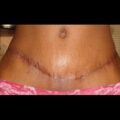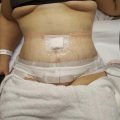According to a study conducted in Nigeria and published in the Global Journal of Health Science Canada, there is an increasing demand for cosmetic procedures in Nigeria but still, the practice is at a slow pace. Most people prefer Nigerian over foreign hospitals for cosmetic surgery for various reasons ranging from cost to convenience.
Tummy tuck also known as abdominoplasty is a cosmetic procedure that tightens the abdomen’s appearance by surgically removing fat and skin, and (in most cases) improving the integrity of the abdominal muscles. This elective surgery is one of several some may consider when looking to slim their midsection, such as may be desired after significant weight loss. Results are not guaranteed to be long-term, but avoiding excess weight gain post-tummy tuck helps maintain a flat stomach.
A tummy tuck surgery flattens the appearance of the abdomen by cutting away excess skin and fat and sewing the skin back together. The procedure might also include surgically fastening the underlying abdominal muscles to give the look and feel of a taut core.
This major surgery uses either a minimally invasive laparoscopic technique (with one or more small incisions and the assistance of a camera to visualize the structures) or a more extensive open method (involving one or more incisions that provide the surgeon with visibility and access to the abdominal fat and underlying muscles).
Contraindications
You will be advised against having this procedure if you have a high risk of surgical complications. You may be at risk of post-surgical problems if you have a major chronic illness, a bleeding disorder, or an immune deficiency. Smoking is also associated with postoperative infections after tummy tuck surgery.
Sometimes, issues like a major infection or newly detected kidney disease would entail postponing surgery until the health problem is under control, even if these problems are discovered on the day of surgery.
It’s important to know that anyone who anticipates significant weight gain or loss, or women who are planning to become pregnant, might experience skin, fat, or muscle changes that alter the cosmetic effects of abdominoplasty. So while the procedure is not prohibited in these individuals, it may not result in the desired outcome.
A permanent post-surgical scar will be visible when you are completely undressed, but it should follow along with a natural crease that runs along the lower abdomen, along the pelvic bone. If you are very concerned about this, you may not want to have a tummy tuck. (Discuss the incision and potential scaring with your doctor in advance so you can make an informed decision in your case.)
Potential Risks
In general, the outcomes of this procedure are good and most people are satisfied with the results. Be aware that this surgery results in a scar along your lower abdomen.
That said, along with the usual risks associated with surgery and anesthesia, abdominoplasty can lead to additional post-operative problems. You might develop health complications or an appearance that is different from what you expected or discussed with your doctor prior to your surgery.
Complications of abdominoplasty can include:
- Wound infection
- Asymmetry of the shape of the abdomen
- Severe scarring or discoloration of the skin
- Loose skin
- Numbness or pain in the surgical region
- Unsatisfying cosmetic results
A complete procedure is more likely to cause complications than a partial procedure.
Questions to Ask Before Plastic Surgery
You will need some pre-operative testing to ensure that you can safely have this procedure, including preliminary lab evaluation such as including a complete blood count (CBC) and electrolyte tests, to evaluate for health problems.
Additionally, your doctor might also do some other pre-operative tests to ensure that you can safely have an abdominoplasty if you have a pre-existing medical issue that puts you at risk of surgery, such as heart disease or pulmonary disease.
How to Prepare
Often, the decision to have a tummy tuck is a process that takes months or longer. You might try weight loss and exercise strategies before deciding to go ahead with this procedure to see if you can achieve the look you want without having to undergo surgery.
You will want to make sure that you are at a relatively stable weight before you schedule your abdominoplasty so you can maximize the benefits of the procedure.
What to Expect on the Day of Surgery
When you arrive at your appointment, you will sign consent forms and check in. You will be guided to a pre-op area, where you will change into a gown and have your vital signs—temperature, blood pressure, pulse, oxygen level, and respiratory rate—checked.
You might have some blood tests, including CBC and electrolyte tests, to make sure you don’t have an acute health problem or infection. Your vital signs will be continuously monitored before, during, and for at least a few hours after your surgery.
Before the Surgery
When it’s time for your surgery, you will go to the operating room or surgical suite. You will have an intravenous (IV) line placed. You may also have a urinary catheter placed so your bladder can release urine, especially if you will have general anesthesia.
You might have general anesthesia or IV sedation (monitored anesthesia care) during your procedure:
IV sedation might be used for a partial abdominoplasty. If this is the case, an anesthetic medication will be injected into your IV to make you sleepy.
Generally, a more extensive surgical procedure will require general anesthesia. You will have anesthetic medication inserted in your IV, and it will paralyze your muscles to the extent that you won’t be able to breathe on your own. For this reason, you will be intubated with a breathing tube so you can breathe with mechanical assistance during your surgery.
Your surgical team will place a drape around your abdomen, exposing the area where you will have your incisions. Your skin will be cleansed with an antiseptic solution. Your surgeon may measure or mark areas on your abdomen prior to making incisions.
Recovery
Recovery from any type of abdominoplasty takes two weeks to two months. Generally, however, if you have a large wound and/or had a substantial amount of skin and fat removed, you should expect a longer recovery than if you have a small wound and had a small amount of tissue removed. Careful postoperative management helps prevent complications.
How Do You Recover From a Tummy Tuck?
Healing
Keep the area clean and dry, and be sure to care for your wound and drain according to the instructions you received in the hospital. Be sure you are clear on how to replace your dressing when needed and whether or not the dressing is waterproof, so you take any necessary precautions to keep the area dry while bathing.
The visible abdominal scar from your tummy tuck procedure may not significantly fade until one-year post-surgery. Keeping it protected from the sun can help heal. You will need to wear a compression garment over your bandage and underneath your clothes during your recovery period to keep swelling in check.
If you develop pain, redness, drainage, pus, fevers, or chills, call your doctor promptly. The same is true if fluid coming from your surgical drain (if you have one) increases in quantity or begins to look bloody or cloudy.
In the weeks after your tummy tuck surgery, you should avoid strenuous activity and avoid lifting heavy objects. When you have your doctor’s permission, you can return to work and start to exercise.
Follow-Up
When you go to your follow-up appointments with your doctor, your drain and wound will be examined. When the drain is no longer needed, it will be pulled. A suture or sterile strip may be placed to close off the opening in the skin. Your surgical wound will be inspected and any non-absorbable stitches will be removed once it has healed. You shouldn’t need any specific long-term care after recovering from a tummy tuck surgery.
How Much Does A Tummy Tuck Cost In Nigeria
According to Medcontour, Tummy Tuck cost in Nigeria ranges from 850k Naira to 1.3 million Naira. For the actual cost of Tummy Tuck depend on other multiple factors.
Who is the Best Tummy Tuck Surgeon in Nigeria?
There are many Tummy Tuck surgeons in Nigeria like Lagos, Abuja, Port Harcourt, Kano, Ibadan, etc. Find Best Tummy Tuck surgeon based on Rating and Reviews
What is the Success Rate of Tummy Tuck Surgery in Nigeria?
Tummy Tuck Surgery in Nigeria is above 90%. You need to find the Best Tummy Tuck surgeon based on Rating and Reviews. SEE: How Much Does A Tummy Tuck Cost In South Africa?





